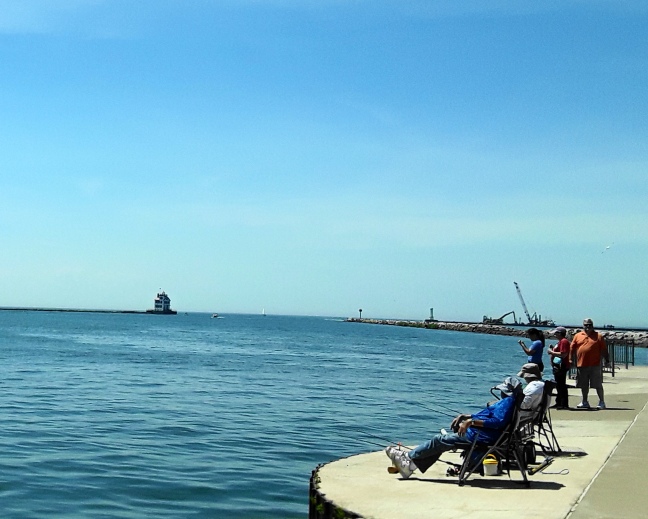A quick run through the New Testament, featuring the book of Acts:
The Holy Spirit
- The Holy Spirit empowered Jesus first, because the Holy Spirit and Jesus both are God. This is beyond our ability to understand – but it’s true anyway. Our God is that big; in some ways, we cannot understand Him. But because He was as human as He was divine, there are plenty of things we can understand about Him.
- Living in the Spirit is moment-by-moment fellowship with Jesus. We can pray deep prayers in scheduled “quiet times,” and we also can hold a conversation with Him as the day rolls on.
- The same Spirit who lived in the apostles lives in you and me today. Which means we have the same power and authority that the apostles did.
- The same Spirit in Christ lives in me. Since the Spirit is God, and Christ is God, therefore Christ – the same Christ who died on the cross nearly 2,000 years ago – lives in me.
Deception, trials, sin
- The apostles had no idea Judas would betray Jesus. They asked: Is it I, Lord? Judas, without the Spirit, deceived them. (Later, Ananias and Saphira tried to deceive over material possessions, and were found out – Acts 5).
- Simon (Acts 8) wanted Jesus and his own magic at the same time. God and … doesn’t work.
- Trials are like taking our faith to the gym. That’s how we grow. The flood meant Noah and his family could never return to their old life.
The Gospel
- The resurrection is fact, not emotion. This means our faith is based on fact, not hearsay or feelings.
- The most hated truth in the Bible is hell. This is what we are saved from.
- We cannot save ourselves. And the world cannot save us, either. Only Jesus can.
- We are to share our faith, not consume it. We are not sponges; we need to be wrung out.
- Christianity is more than doctrine or beliefs. It’s a way of living. Who are you, Lord? – is the most important question we can ask.
- Salvation requires no action on our part – only to believe. It’s 100 percent a God thing. It’s inward, not outward.
- Jesus is the message. The apostle Paul, a scholar, claimed to know nothing except Jesus and Him crucified (1 Corinthians 2:2).
- Jesus rose to live forever – not like Lazarus, who rose on Earth for a short time.
- Christianity is not behavior modification. A changed heart is the result.
- Why do some people discount the Gospel? For several reasons: We don’t want to face our sins or be held accountable; we want to do something for it; and/or resurrection is not logical.
Living the Christian lifestyle
- Jesus said rivers of living water will flow from believers’ hearts (John 7:37-39). Living water, by definition, gives life, comforts and soothes. It moves. It quenches thirst, permanently.
- The first believers devoted themselves to the apostles’ teaching (about Jesus), fellowship (sharing life), the breaking of bread (communion) and prayer (Christ-centered). This modeled unprecedented unity, which Jesus prayed for in John 17.
- No one in Acts prayed for safety or good health – only for courage to share the Gospel boldly.
- God can use anything – peace or trials. With trials, passion and purpose will come into sharp focus.
- “Rights” are not for me, but for others, to promote the Gospel (1 Corinthians 8-9).
- We are to keep ourselves unstained from the world (James 1:27). We are to live in the world, but not be consumed by its values.
- If my heart is right, my words and actions will come out naturally. I don’t have to “practice” evangelism. I need to know the basics and how Jesus has changed my life. I need to live that way, and talk that way too.
- Sin distorts the message of the Gospel. We must acknowledge this and seek forgiveness – first from God, then from others. Not just once, but repeatedly.
- God’s will benefits everyone. Sin is not God’s will. He allows sin so that we can accept forgiveness, then change our lifestyles.
- We do not follow people who point to Christ; we follow Christ Himself.
Servants of God
- Abraham and Moses’ ministries began when they were old. God takes the long view.
- Stephen did not defend himself, but defended Jesus and His crucifixion and resurrection. Unlike the religious leaders of his day, Stephen did not worship the temple itself, but the living God.
- Stephen had no fear of death – he was already dead to sin and alive in Christ.
- Stephen personified all of the fruits of the Spirit listed in Galatians 5: love, joy, peace, patience, kindness, goodness, faithfulness, gentleness and self-control.
- Cornelius, a non-Jew, and Peter both had lessons to learn (Acts 10), even though Peter was an early church leader.
- Peter escapes from prison but the apostle James, one of Jesus’ inner three, is killed (Acts 12). The believers undoubtedly were praying for both, with different “answers” from God. We can’t understand all of God’s answers to prayer.
- Paul valued serving God over his own safety.
- God allowed Paul to remain in prison (Acts 25) for several reasons: he was safe there (many people wanted him dead), he wrote epistles there, and his friends were allowed to care for him there.
- The people of Malta judged Paul twice after he was bitten by a viper (Acts 28:1-10). He was a murderer, the gods were bringing justice; then, when nothing happened, they worshipped him as a god. Both judgments were wrong.
Hope
- Jesus is preparing a place for us in heaven.
- We could lose our wealth or health overnight. Hope in God is not like that; once Jesus changes our hearts, we are sealed for heaven forever.
- Hope is confident expectation, not wishful thinking.
Who God is
- The law shows our need. Jesus meets our need.
- The church fails, people fail, things fail, but the word of God never fails.
- God sits on a throne of grace (forgiving us for our sins), not wrath (Heb. 4:14-5:10).
Faith
- Faith is the assurance of things hoped for, the conviction of things not seen (Hebrews 11). It’s outlandish: Abraham was asked to sacrifice Isaac, his promised son, on faith that God would keep His promise of many descendants. Abraham obeyed, and God honored that (by stopping the sacrifice before it actually happened).
- The Bereans tested Paul’s words with Scripture (Acts 17), then believed Paul when they discovered his words matched what they read about the living God.
- Faith requires some belief.
- Faith is not knowledge – even the demons know who Jesus is (James 1-2). Faith is living by knowledge.





 screaming baboons, sleeping snakes, red gums ready for their sweet white blood. In a way, he thought, they were right. The more coloredpeople spent their strength trying to convince them how gentle they were, how clever and loving, how human, the more they used themselves up to persuade whites of something Negroes believed could not be questioned, the deeper and more tangled the jungle grew inside. But it wasn’t the jungle blacks brought with them to this place from the other (livable) place. It was the jungle whitefolks planted in them. And it grew. It spread. In, through and after life, it spread, until it invaded the whites who had made it. Touched them every one. Changed and altered them. Made them bloody, silly, worse than even they wanted to be, so scared were they of the jungle they had made. The screaming baboon lived under their own white skin; the red gums were their own.
screaming baboons, sleeping snakes, red gums ready for their sweet white blood. In a way, he thought, they were right. The more coloredpeople spent their strength trying to convince them how gentle they were, how clever and loving, how human, the more they used themselves up to persuade whites of something Negroes believed could not be questioned, the deeper and more tangled the jungle grew inside. But it wasn’t the jungle blacks brought with them to this place from the other (livable) place. It was the jungle whitefolks planted in them. And it grew. It spread. In, through and after life, it spread, until it invaded the whites who had made it. Touched them every one. Changed and altered them. Made them bloody, silly, worse than even they wanted to be, so scared were they of the jungle they had made. The screaming baboon lived under their own white skin; the red gums were their own.

